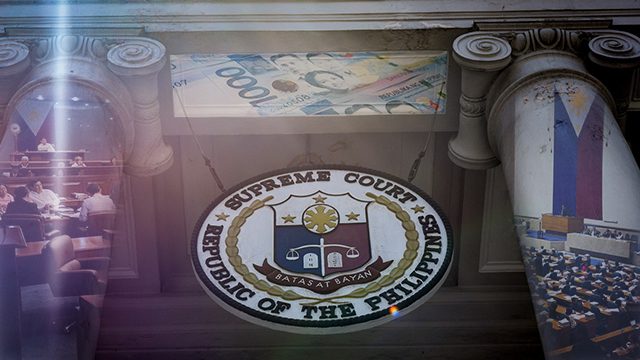SUMMARY
This is AI generated summarization, which may have errors. For context, always refer to the full article.

MANILA, Philippines – It’s now almost the middle of March yet we still don’t have a national budget for 2019 as a new tug-of-war ensues between the Senate and the House of Representatives over adjustments made post-bicameral conference committee.
The 2019 national budget was ratified by both houses during the bicameral conference, but it cannot be sent to President Rodrigo Duterte yet after Senator Panfilo “Ping” Lacson accused the House of making adjustments that favor allies.
The controversy originates from the P15-billion budget for the Health Facilities Enhancement Program (HFEP), P4.5 billion of which went to the House, P2 billion to the Senate, and the rest to the Department of Health.
It turned out that when the general allotments were ratified by the bicam, the House itemized its lump-sum allocation and distributed it to its members.
Lacson alleged that P25 million went to legislators who supported Representative Gloria Macapagal Arroyo’s speakership, while only P8 million went to those who didn’t.
House appropriations chair Rolando Andaya disputed this, saying the distribution was based on their districts’ needs, but could not yet at the moment publicly release a detailed breakdown of the distribution.
The question here is – was it legal for the House to itemize its lump sum post-bicam?
Andaya said the Supreme Court only prohibited adjustments post-enactment, not post-ratification. Strictly speaking, Andaya is correct.
What the Supreme Court says
When the Supreme Court (SC) declared the system of Priority Development Assistance Fund (PDAF) illegal in 2013, it prohibited legislators from participating any further in budget implementation post-enactment or after the president has signed the budget into law.
“Any post-enactment-measure allowing legislator participation beyond oversight is bereft of any constitutional basis and hence, tantamount to impermissible interference and/or assumption of executive functions. Any post-enactment congressional measure should be limited to scrutiny and investigation,” the SC said.
The SC did not say anything about touching the budget post-bicam in a 72-page ruling penned by Associate Justice Estela Perlas-Bernabe, which got unanimous concurrence. Retired justice Presbitero Velasco abstained because his son was then a member of the House.
“The Supreme Court decision states post-enactment, meaning to say, may batas na. Wala pa tayong batas ngayon (there’s a law already. We don’t have a law yet.) It’s only when the President signs it [that] this law applies,” said Andaya on Monday, March 11.
President’s veto power
Andaya claimed that the Senate is holding the entire budget hostage for an amount that Duterte can veto if he finds it irregular.
“Eh kung mali, eh ‘di i-veto na lang, i-veto ng Presidente. Kung anumang halaga ‘yon, eh ‘di i-veto niya! Bakit mo isa-sacrifice ‘yong buong budget para sa perang napakaliit na halaga?” asked Andaya.
(If there’s something wrong, then the President can veto it. Whatever amount it may be, he can veto it! Why sacrifice the entire budget for a small amount?)
Andaya’s reasoning has basis in the Supreme Court decision.
The Supreme Court did not like that under the PDAF system, the president was being forced into “the predicament of either vetoing the entire appropriation if he finds some of its purposes wasteful or undesirable, or approving the entire appropriation so as not to hinder some of its legitimate purposes.”
The wisdom of the justices was to allow the president to exercise his veto power perceptibly. Andaya claimed that this veto power remains in effect when applied to adjustments made post-bicam.
“This treatment not only allows the item to be consistent with its definition as a ‘specific appropriation of money’ but also ensures that the president may discernibly veto the same,” said the Supreme Court.
Andaya claimed that the Senate also itemized its allotment post-bicam. Senators have not responded to that claim yet.
Line-item budgeting
Former audit commissioner Grace Pulido Tan, who was tapped by the Supreme Court as an expert during oral arguments in 2013, recommended line-item budgeting “which provides the line by line allocation of inputs defined as the amount of resources used to produce outputs.”
Concurring justice Antonio Carpio agreed with Tan and said: “Congress has the constitutional duty to present to the President a General Appropriations Act (GAA) containing items, instead of lump-sums, stating in detail the specific purpose for each amount of appropriation, precisely to enable the President to exercise his line-item veto power. Otherwise, the President’s line-item veto power is negated by Congress in violation of the Constitution.”
The majority decision adopted Carpio’s instruction and said: “It is crucial that each percentage or value must be allocated for its own corresponding purpose for such component to be considered as a proper line-item.”
For his part, Andaya can promise this much: “Itemized saka alam mo kung sino. Ang importante naman dito, anong distrito at ang gusto ng publiko malaman sino ‘yung mambabatas na nagsisilbi sa distrito na ‘yun.”
(It’s itemized and you would know who got it. What’s important here is which district it went to, and for the public to know which lawmaker is serving in that district.)
Now it is incumbent upon the Senate to rigorously perform its oversight function, and for the President to scrutinize whether the House’s itemization satisfies the requirement of the Supreme Court when it comes to line-item budgeting. – Rappler.com
Add a comment
How does this make you feel?
There are no comments yet. Add your comment to start the conversation.